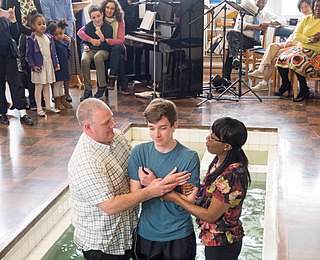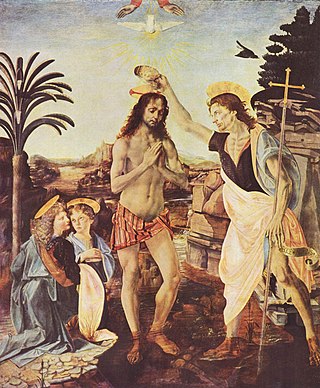Born again, or to experience the new birth, is a phrase, particularly in evangelicalism, that refers to a "spiritual rebirth", or a regeneration of the human spirit. In contrast to one's physical birth, being "born again" is distinctly and separately caused by baptism in the Holy Spirit, it is not caused by baptism in water. It is a core doctrine of the denominations of the Anabaptist, Moravian, Methodist, Quaker, Baptist, Plymouth Brethren and Pentecostal Churches along with all other evangelical Christian denominations. All of these Churches strongly believe Jesus's words in the Gospels: "You must be born again before you can see, or enter, the Kingdom of Heaven." Their doctrines also mandate that to be both "born again" and "saved", one must have a personal and intimate relationship with Jesus Christ.

The Westminster Confession of Faith is a Reformed confession of faith. Drawn up by the 1646 Westminster Assembly as part of the Westminster Standards to be a confession of the Church of England, it became and remains the "subordinate standard" of doctrine in the Church of Scotland and has been influential within Presbyterian churches worldwide.

The charismatic movement in Christianity is a movement within established or mainstream Christian denominations to adopt beliefs and practices of Charismatic Christianity with an emphasis on baptism with the Holy Spirit, and the use of spiritual gifts (charismata). It has affected most denominations in the US, and has spread widely across the world.
The Wesleyan Church, also known as the Wesleyan Methodist Church and Wesleyan Holiness Church depending on the region, is a Methodist Christian denomination in the United States, Canada, the United Kingdom, South Africa, Namibia, Sierra Leone, Liberia, Indonesia, and Australia. The church is aligned with the Wesleyan-Holiness movement and has roots in the teachings of John Wesley. It adheres to Wesleyan-Arminian doctrine and is a member of the World Methodist Council.
Sanctification literally means "to set apart for special use or purpose", that is, to make holy or sacred. Therefore, sanctification refers to the state or process of being set apart, i.e. "made holy", as a vessel, full of the Holy Spirit of God. The concept of sanctification is widespread among religions, including Judaism and especially Christianity. The term can be used to refer to objects which are set apart for special purposes, but the most common use within Christian theology is in reference to the change brought about by God in a believer, begun at the point of salvation and continuing throughout the life of the believer. Many forms of Christianity believe that this process will only be completed in Heaven, but some believe that complete holiness is possible in this life.
Transformational Christianity, or Transformationalism, represents a fusion of evangelicalism, Pentecostalism, and ecumenism that started becoming prominent in the early 21st century. Unlike previous movements, it is typically embodied in regional meta-church organizations—alliances of churches from different denominational backgrounds—rather than particular churches, denominations, or parachurch organizations. Critics of Transformationalism accuse it of overemphasizing eschatology, false dichotomies, unnecessary idealism and a tendency to be corrosive of individual church identities.

The New Covenant is a biblical interpretation which was originally derived from a phrase which is contained in the Book of Jeremiah, in the Hebrew Bible.

Mainstream Baptists is a network of Baptists in fourteen U.S. states that have organized to uphold historic Baptist principles, particularly separation of church and state, and to oppose Fundamentalism and Theocratic Calvinism within the Southern Baptist Convention. As such, it is not a denomination, but rather an organization that provides resources, support, and interagency communication. Organizations/agencies considered to share Mainstream Baptists and cooperate with and support the network are listed below under External links.

The Moravian Church, or the Moravian Brethren, formally the Unitas Fratrum, is one of the oldest Protestant denominations in Christianity, dating back to the Bohemian Reformation of the 15th century and the Unity of the Brethren founded in the Kingdom of Bohemia, sixty years before Luther's Reformation.

The Catholic Charismatic Renewal is a movement within the Catholic Church that is part of the wider charismatic movement across historic Christian churches.
Evangelical Friends Church International (EFCI) is a branch of Quaker yearly meetings around the world that profess evangelical Christian beliefs.

Eucharistic theology is a branch of Christian theology which treats doctrines concerning the Holy Eucharist, also commonly known as the Lord's Supper. It exists exclusively in Christianity and related religions, as others generally do not contain a Eucharistic ceremony.

Evangelical Free Church of China (EFCC) is a Chinese Protestant denomination historically based in Mainland China and Hong Kong. It is today one of the largest evangelical denominations in Hong Kong.
Regeneration, while sometimes perceived to be a step in the Ordo salutis, is generally understood in Christian theology to be the objective work of God in a believer's life. Spiritually, it means that God brings a person to new life from a previous state of separation from God and subjection to the decay of death. Thus, in Lutheran and Roman Catholic theology, it generally means that which takes place during baptism. In Calvinism and Arminian theology, baptism is recognized as an outward sign of an inward reality which is to follow regeneration as a sign of obedience to the New Testament; as such, the Methodist Churches teach that regeneration occurs during the new birth.

The Evangelical Protestant Church (GCEPC) or The Lutheran Evangelical Protestant Church (LEPC) is a mainline Protestant denomination under the General Conference of Evangelical Protestant Churches headquartered in Cayce-West Columbia, South Carolina, USA.

The Movement of the Word of God, also called Work of God the Father, is a pastoral community of disciples, a lay ecclesial movement within the Roman Catholic Church.

Wesleyan theology, otherwise known as Wesleyan–Arminian theology, or Methodist theology, is a theological tradition in Protestant Christianity based upon the ministry of the 18th-century evangelical reformer brothers John Wesley and Charles Wesley. More broadly it refers to the theological system inferred from the various sermons, theological treatises, letters, journals, diaries, hymns, and other spiritual writings of the Wesleys and their contemporary coadjutors such as John William Fletcher.
Mount Ararat Church is a Baptist church located in Stafford, Virginia. Todd Gaston was the Senior Pastor of the church.
In religion, a covenant is a formal alliance or agreement made by God with a religious community or with humanity in general. The concept, central to the Abrahamic religions, is derived from the biblical covenants, notably from the Abrahamic covenant. Christianity asserts that God made an additional covenant through Jesus Christ, called the "new covenant".

Charismatic Christianity is a form of Christianity that emphasizes the work of the Holy Spirit, spiritual gifts, and modern-day miracles as an everyday part of a believer's life. Practitioners are often called Charismatic Christians or Renewalists. Although there is considerable overlap, Charismatic Christianity is often categorized into three separate groups: Pentecostalism, the Charismatic movement, and the Neo-charismatic movement.